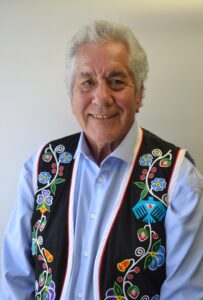Chippewas of the Thames Chief appointed new member of the Order of Canada

By Rick Garrick
CHIPPEWAS OF THE THAMES FIRST NATION — Chippewas of the Thames First Nation Chief Joe Miskokomon (Richard Kelly Miskokomon) was recently appointed as one of 64 new members of the Order of Canada by Mary Simon, Governor General of Canada. The Governor General’s office also announced the appointment of one companion, 16 officers, and two honourary officers on June 27.
“It’s a great honour,” Chief Miskokomon says, noting that other First Nations people were also recognized by the Governor General for their skills and contributions. “So I feel particularly honoured to be a part of that group of [Indigenous] people that has been recognized by the Governor General of Canada. And I hope that more of my people in the future will see that recognition and get that recognition for their contributions to not only our people but the country of Canada.”
A former Grand Council Chief of the Anishinabek Nation, Chief Miskokomon has helped advance First Nations self-governance, safeguard Indigenous rights and treaties, and encourage community economic development for more than five decades. He is also noted for his successful negotiation of two major land claim settlements with the federal government.
“It’s been a lifetime — I became involved initially as one of the first executive directors of the Chiefs of Ontario when I was a young man,” Chief Miskokomon says. “So I gained a great deal of experience as I helped develop that organization of the Chiefs of Ontario. Shortly after that, I was asked by the executive of the National Indian Brotherhood to head up the lobby for the National Indian Brotherhood in London, England, on the patriation of the constitution, so I spent time there lobbying for constitutional rights to be embedded within the Constitution of Canada, which we now recognize as Sections 28 and 35.”
Chief Miskokomon says during his four terms as Grand Council Chief of the Anishinabek Nation, they had success in getting federal and provincial legislation through in terms of working on Aboriginal and treaty rights.
“We were able to make a number of strides and steps that I think really advanced not only our rights through treaty, but also social development rights, health services, education, and a litany of other things,” he says.
Chief Miskokomon says he has also been on council in his community for more than 25 years.
“I’ve worked with every national chief since the inception of the AFN (Assembly of First Nations),” Chief Miskokomon says. “And there’s been a lot of great organizations that I’ve been able to lend a small part of my voice to help their development and putting through legislation that has borne the test of time for close to 30 years.”
Miskokomon says he has received congratulatory notes and telephone calls from his community, as well as First Nation leaders across the country.
“As I’ve said to reporters that have contacted me, I never went into this for self-glorification,” he says. “I was at the right time and the right spot and I got into this for what I believe were the right reasons and I’ve stayed in it all my life.”
The Order of Canada, which was established in 1967, recognizes people from across all sectors of society who have made extraordinary and sustained contributions to the country.
“The Order of Canada recognizes individuals who have made positive and lasting impacts on communities here in Canada or who have brought honour to our country abroad,” Simon says. “As we progress towards an Order that is reflective of Canada’s full diversity, I encourage all Canadians to nominate individuals who inspire them, from all walks of life and backgrounds. Congratulations to the new appointees and thank you to the nominators who cast a spotlight on their achievement, purpose and exceptional talent.”

